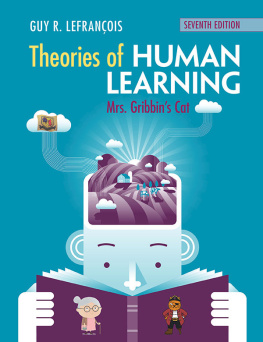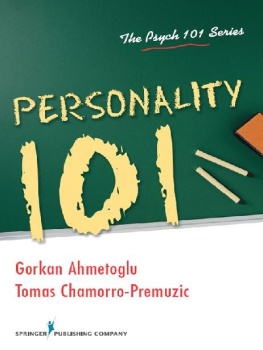SELF-THEORIES
Essays in Social Psychology
MILES HEWSTONE, UNIVERSITY OF CARDIFF, GENERAL EDITOR
Essays in Social Psychology is designed to meet the need for rapid publication of brief volumes in social psychology. Primary topics will include social cognition, interpersonal relationships, group processes, and intergroup relations, as well as applied issues. Furthermore, the series seeks to define social psychology in its broadest sense, encompassing all topics either informed by, or informing, the study of individual behavior and thought in social situations. Each volume in the series will make a conceptual contribution to the topic by reviewing and synthesizing the exisiting research literature, by advancing theory in the area, or by some combination of these missions. The principal aim is that authors will provide an overview of their own highly successful research program in an area. It is also expected that volumes will, to some extent, include an assessment of current knowledge and identification of possible future trends in research. Each book will be a self-contained unit supplying the advanced reader with a well-structured review of the work described and evaluated.
Published titles
- Sorrentino and Roney The Uncertain Mind
- Van der Vliert Complex Interpersonal Conflict Behaviour
Titles in preparation
- Bodenhausen and Macrae Stereotype Use
- Carnevale The Psychology of Agreement
- Gaertner and Dovidio Reducing Intergroup Bias
- Kruglanski The Psychology of Closed-Mindedness
- Mackie Emotional Aspects of Intergroup Perception
- Semin and Fiedler The Linguistic Category Model
- Turner Social Identity and Self-Categorization Theory
- Tyler and Blader Cooperation in Groups
Self-Theories
Their Role in Motivation, Personality, and Development
Carol S. Dweck
Columbia University
Essays In Social Psychology
Psychology Press
Taylor & Francis Group
711 Third Avenue
8th Floor
New York, NY 10017
www.psypress.com
Published in Great Britain by
Psychology Press
Taylor & Francis Group
27 Church Road
Hove, East Sussex BN3 2FA
2000 by Taylor & Francis Group, LLC
Psychology Press is an imprint of Taylor & Francis Group
International Standard Book Number-13: 978-1-84169-024-7 (Softcover)
Cover design by Fielding Rowinski
Except as permitted by U.S. Copyright Law, no part of this book may be reprinted, reproduced, transmitted, or utilized in any form by any electronic, mechanical, or other means, now known or hereafter invented, including photocopying, microfilming, and recording, or in any information storage or retrieval system, without written permission from the publishers.
Trademark Notice: Product or corporate names may be trademarks or registered trademarks, and are used only for identification and explanation without intent to infringe.
Library of Congress Cataloging-in-Publication Data
Catalog record is available from the Library of Congress
Visit the Taylor & Francis Web site at
http://www.taylorandfrancis.com
and the Psychology Press Web site at
http://www.psypress.com
Contents
Carol S. Dweck is Professor of Psychology at Columbia University. She is a leader in the fields of motivation, personality and developmental psychology and her research contributions have been widely recognized. Her previous books include Personal Politics (with Ellen Langer) and Motivation and Self-Regulation Across the Life-Span (co-edited with Jutta Heckhausen).
I have always been deeply moved by outstanding achievement, especially in the face of adversity, and saddened by wasted potential. I have devoted my career to understanding both. For almost 30 years, I have done research on motivation and achievement. This book presents the findings from my research, and, as you will see, many of these findings challenge conventional wisdom.
Because I am first and foremost a researcher, I have tried to convey to the reader my love of the research processhow research can address deep and real questions in a precise way, how exciting it is to learn something important you didn't know before, and how each study raises pressing new questions for the next study to explore. Research lures you down uncharted paths, with each turn revealing something new.
Research is also extremely difficult. The experiments must set up lifelike situations. Each one requires a host of new measures, all of which have to be refined and tested. There are countless details of experimental design that have to be observed for the results to be valid. Our experiments often involve over 100 students, yielding masses of data for analysis. The reader is spared these details, but the research buff can find them by consulting the research papers that are cited in each chapter.
A few details, however, are in order. The reader should know that all of the results cited in this book are statistically significant ones, that is, ones shown by statistical tests to be reliable findings. But keep in mind that almost no findings in psychological research are all or nothing. Not every student in an experimental group did the same thing. The results describe what the group as a whole, on average, did.
Many thousands of students have participated in our studies. Who are these students? They range from preschool through college. They come from all over the countryfrom rural towns as well as from large citiesand they represent many different ethnic groups. So the findings are not limited to a narrow segment Df our society but have broad applicability.
It is also important to know that all of the students in our studies are there on a voluntary basis and are encouraged td discontinue their participation at any point along the way if they wish to. Each session, in addition, ends with a highly positive experience, in which the students master difficult material.
When I talk about the research I will typically use "we." This is because almost ill of the research was carried out in collaboration with my graduate students and postdoctoral fellows. One of the joys of a research career is working closely with extraordinary young scholars, and I have been particularly fortunate in this regard. This work would not have been possible without them.
Much of this book is about how people make and sustain commitments to things they value. I would like to dedicate the book to my husband, David, who taught me a great deal about this process.
Carol S. Dweck
New York, January, 1999
At this point in a book, the author usually places his or her work in a theoretical context: What are the past theories in the areain this case, theories of motivation, personality, and their development? What were they trying to explain? What is my theoretical approach? What are its advantages?
However, these are questions that are hard to address in an interesting or enlightening way before we have a common ground. Once we share a body of knowledge, the same questions become much more interesting.
This opening section therefore will be short. I will very briefly present my approach and explain the purpose and the contents of the book. Then, in the next to-last chapter, I will return to the broad theoretical questions.
The "Meaning System" Approach











